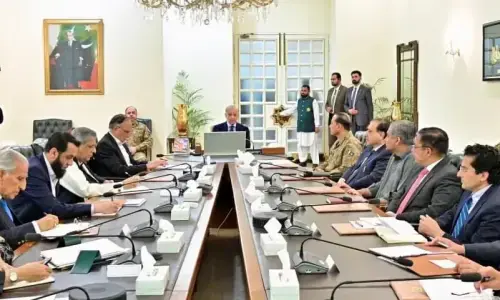A MONTH before his death in 1942, he uttered these prophetic words: “Pakistan is now inevitable. It is bound to come [into being] sooner or later. My purpose in life is at last achieved. Life has no more interest or excitement for me. I have had more than [what] I deserved. Now our children will be free citizens or a free country.” This was Haji Sir Abdullah Haroon, one of Quaid-i-Azam Mohammad Ali Jinnah’s lieutenants and a member of the Muslim League Working Committee that drafted the 1940 Pakistan Resolution. After returning from Delhi he remarked: “The big goal is in sight. We are at last on our way to it.”
His death ended a full life that included service to his people through education, philanthropy, lawmaking, and, yes, business — conducted with such honesty that Gandhi said of him: “I will trust this man with a blank cheque”. Inspired by a mother who had become a widow at 17 when he was four, Haroon began his modest career in tradecraft in Karachi at 16 to ultimately become one of India’s richest men and was often called Sindh’s sugar king. Of his mother he used to say, “I’m as my mother made me.”
Having overcome the trauma of poverty by the time he was 31, Haroon began his reformist activities by founding the Sindh Muhammadan Association in 1910 to address his people’s social, especially educational problems, with massive donations to schools in Sindh and India, including the Aligarh University, besides giving succour to the people of Palestine and Turkey during the First World War and its aftermath, particularly to the victims of Izmir’s arson outrage.
Gradually Haroon gravitated toward India’s larger anti-colonial struggle dominated by such giants as Jinnah, Gandhi and the Ali Brothers whose Khilafat movement and the boycott of British products had rocked South Asia. He had only seven years of formal schooling, but his grasp of politics was uncanny. His tireless efforts for the Khilafat cause led to his election in 1924 as chief of the Sindh Provincial Khilafat Committee and in 1927 as president of the Central Khilafat Committee, wearing khaddar being part of his commitment to the charismatic Ali duo.

Initially he chose Congress in 1917 as a national party that could lead all of India’s people towards freedom but, like many Muslim leaders, including Jinnah, was disillusioned by its communal policies and in 1938 joined the All-India Muslim League, where he rose rapidly to become a member of the ML Working Committee.
Yet Sindh was never far from his thoughts, especially because the people of Sindh suffered a great deal since their province was an appendage to the Bombay presidency. Most Muslim leaders believed Sindh’s interests would be better served if it became a province on its own. This was also one of Jinnah’s 14 points. Along with others, Haroon began working for a constitutional scheme that would separate Sindh from the geographically large and politically unwieldy Bombay province largely non-Muslim — an aim they finally achieved with the enactment of the Government of India Act, 1935.
He was the man behind the Sindh Muslim League and was elected its president in 1939. It was mainly due to his efforts that shortly before his death, the year 1942 saw Sindh having an all-Muslim League ministry. As a lawmaker, he served for three years in the Bombay Legislative Assembly and later for 17 years in the Central Legislature at Delhi.
In 1939, at the Quaid’s behest, he invited leading Muslim scholars to his Delhi home to get their input on the Muslim struggle for freedom and on the Pakistan idea. The committee, consisting of such scholars as Ghulam Rasul Meher, Nawab Mamdot, Pir Ali Mohammad Rashdi, Dr Afzal Hussain Qadri and Abdul Latif — names now all but forgotten — recommended to the Muslim League high command that a state extending from what was then the North-Western Frontier Province to Delhi and Agra would include 70 per cent of India’s Muslim population.
As the subcontinent seemed moving towards independence and partition with every possibility of widespread violence, Haroon formed the Muslim League National Guards, headed by his son, Yusuf, to counter any threats from militant Hindu organisations.
He was generous, philanthropist and a good host, for the Quaid used to stay at Seafield, his Karachi home, which also once had as its guest an iconic woman leader, Bi Amman, the Ali brothers’ mother. Among his earliest philanthropist deeds were Jamia Islamia Yatimkhana in Karachi’s Lyari area, the Cutchi Memon School for Girls and Muslim Gymkhana and Playground.
Looking at the orphanage he founded, he remarked, “It will be a source of inspiration to some of the orphans that I, an orphan, rose to such heights.” He was born in 1872 and died this day in 1942.
The writer is Dawn’s Readers’ Editor and author.
Published in Dawn, April 27th, 2019





























